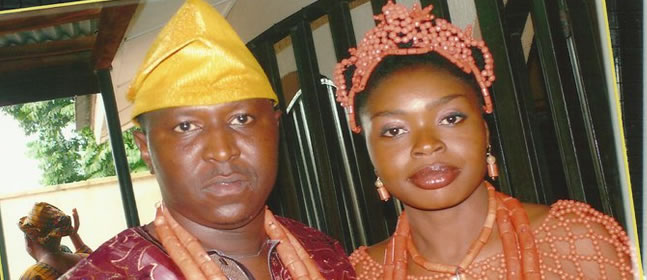Manual Labour: Most parents use this as a barometer for measuring their daughter’s loyalty to their husband. The ability of the son-in-law to render his father-in-law this essential service helps to strengthen the relationship between the two families. Usually, a son-in-law assists his father-in-law in the clearing of his farm lands annually. At Usen and its environs, the Bridegroom only renders some service to his in-law in the farms and at home once in every three years.
Gifts: The Bini receive numerous gifts from their sons-in law during and after annual festivals. These include tubers of yam, a keg of palm-wine, kola-nuts, and legs of antelopes. They presented as gifts during festivals such as “Eho” and “Igue “
The Social Status of Husband: In all Bini communities, marriage does not remove a man from his age group but it only enhances his social prestige among members of his age group. He partakes in all communal activities undertaken by his age group. But in some clans such as Usen, a newly married man is exempted from communal labour for three months which is regarded as his honeymoon.
 Wife:
Wife: In the Bini Communities, a married woman is regarded as “Okhuoba” and she is highly respected among her age ‘group. She is free from public molestation. Any case of misconduct on her part is usually referred to her husband for settlement. Only her husband can take any form of disciplinary action against her since it is a taboo to touch a married woman on the waist or any part of her body. Just like her husband, she partakes in all the communal activities of her village or town.
CHILDREN:
Male: The male children (emikpia) of any traditional marriage are highly respected in their communities. The eldest son (Omodion) is regarded as the heir apparent. He commands respect among his other brothers and sisters. They look up to him as their future father. Traditionally, the male off-springs of a family are entities to their father’s property. Each takes his fair share after the eldest, son has taken his. Primogeniture is practiced in Bini Kingdom.
Female: The female off-springs (emikhuo) take the second place in their father’s house vis-a-vis the male children. They are usually regarded as temporary inmates of their father’s house. Socially, they are respected in their communities and they partake in all communal activities. They also share in their father’s property after the male children have taken theirs.
Gifts: The Bini receive numerous gifts and after annual festivals. These include wine, kola-nuts, and legs of antelopes during festivals such as “Elio” and “Igue “
CHILDREN BORN OUT OF WEDLOCK:
Male: These are regarded as (Emo-ido). In the olden days they play a second fiddle in their father’s house and command less social prestige vis-a-vis those male children born in lawful wedlock. Generally, where the eldest male off-spring of a family is born out of wedlock, he takes the second position in his father’s house irrespective of the fact that he is senior to the one born in lawful wedlock. In other words, his junior in the matrimonial home is regarded as the heir to their position.
The father of a male offspring born out of wedlock is expected to pay the sum of twelve naira or twelve cowries as in the past to the step-father of the child who brought him up before he could have a claim to such a child.
Nowadays the Benin customary law says children born out of wedlock have the same social prestige and right as those born in lawful wedlock. A first son is regarded as a first son whether born in lawful wedlock or out of wedlock.
Female: The female off-springs outside wedlock possess the same social prestige as those born in lawful wedlock. They also maintain their positions in their father’s house according to their respective ages. However, their father is expected to pay the sum of twenty four naira (N24.00) to their step-father before they could be accepted as the legitimate children of the family.
The Status of Families: The Bini traditional marriage system enhances the social status of the families concerned especially if the marriage contracted involves royal or wealthy families. The average Bini person would prefer to marry a member of a family with good social standing Thus; a suitor who marries from a royal family automatically becomes part and parcel of that family. On the other hand, anyone who marries from an unworthy family is equally treated as such.